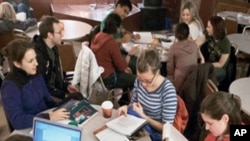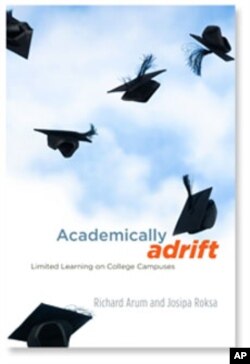This is the time of year when millions of American high-school seniors and their parents scramble to complete the process of finding, and getting accepted by, a college to begin the higher education process in September.
But there’s some doubt about how high that level of learning will be.
The title of a new book tells the story. Based on a recent study by sociologists Richard Arum of New York University and Josipa Roska of the University of Virginia, the title is: "Academically Adrift: Limited Learning on College Campuses."
The professors interviewed 2,300 U.S. college undergraduates and reviewed their academic records.
They concluded that after two years in college, 45 percent of the students showed no significant improvement in key intellectual and creative skills such as critical thinking, complex reasoning, and writing.
These results come at a time when President Barack Obama, his education department and outside reformers are all saying that the United States had better start producing smarter college graduates if it wants to remain competitive globally.
The study of students’ behavior during those first two years in college may provide a clue as to what’s breaking down.
The researchers found that freshmen and sophomores are more concerned with socializing and communicating with friends than with what used to be called “cracking the books.”
Their “critical thinking” would appear to involve choosing the right pizza joint or bar at which to meet those friends.
“It’s good to lead a monk’s existence [in college]," says Eric Gorski, an Associated Press writer who reported on the study. "Students who study alone and have heavier reading and writing loads do well.”
Unfortunately for U.S. educational achievement, not many monastic types appear to be applying to college these days.





